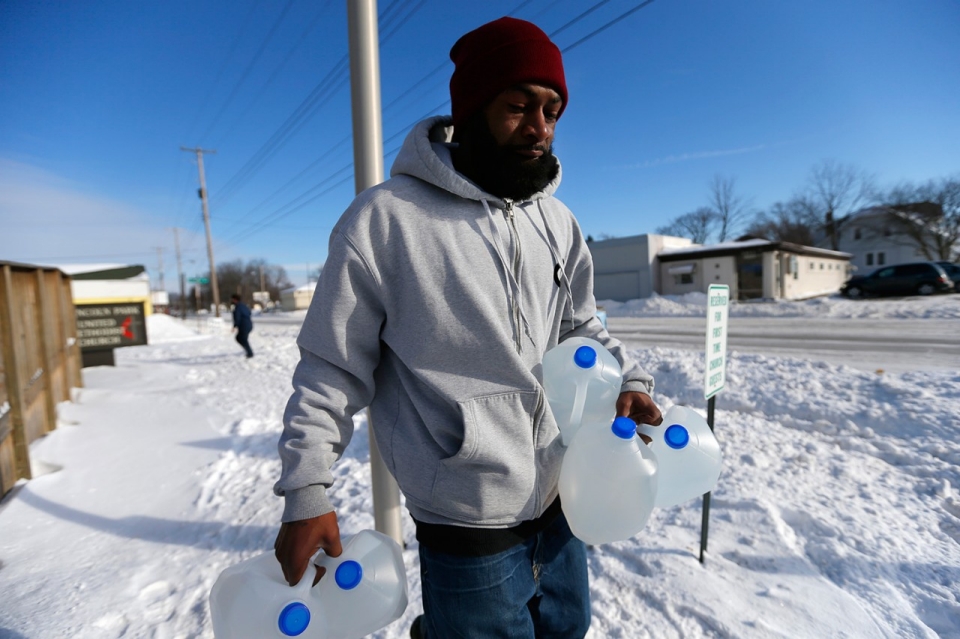The Last Days of the Water Wars
This fictional story takes place in the not-so-distant future in Donbartville™, Michigan. This thriving downtown core of the failed city of Detroit was annexed in 2021 in a hostile corporate takeover precipitated – according to Donbartville™ CEO Dean Donbart – by the raging civic unrest that prompted business leaders to band together and erect a large wall around the city center. Chapter 1 of many…

The traffic is heavy on I-75 North as Bob, an Uber driver, slowly crawls towards Flint. Exhaust fumes ricochet around the tunnel walls that surround him, recently-erected to protect the vital trade route from civic unrest in the suburban streets above. He is carrying cases of plastic PureMichigan Water® bottled in Donbartville for distribution across Southeast Michigan. The bottles swish back and forth in the stop-and-go traffic.
Bob is under orders from the United Way of Donbartville® to deliver this water to thirsty families in Flint as part of the Everyone Drinks! campaign. He has his own private opinions about the city’s water charity program, but ever since Nestle® took over all water extraction from the Great Lakes in a multinational deal with U.S. and Canadian trade officials, the water dollars have been pouring in for drivers like him. Residents of poor communities like Flint were offered free bottled water for life delivered to their door weekly if they’d agree to turn off their taps and sign contracts not to sue the city for lead poisoning or protest at all in the future. Most residents happily complied: PureMichigan Water® is so tasty with its trade-secret vitamin supplements. Only meager opposition came from middle-class suburban ratepayers, who asked why they would have to pay for their weekly rations of Water® while poor residents got it for free. Their concerns were quickly assuaged by United Way representatives in community meetings highlighting the Christian imperative of helping the poor. For those who were more business-inclined, a simple argument of free brand advertising in poor neighborhoods swayed most.
Of course outstanding issues remained, and Bob would be the first to acknowledge if pressed the difficulty of showering and cleaning with bottled Water®. City officials in neighboring Detroit ensured residents that, although the 120-year old corroded municipal pipes were irrevocably damaged, the city was designing a drone-based Water® drop-off system that deposits clean bathing water into rooftop water tanks at an affordable price. For low-income families, Affordability Plans were being designed with simple requirements like 2-minute maximum shower length and 1 bowl of cooked rice per meal. For the neediest families, an innovative public-private partnership with The Coca-Cola Company™ would provide free bathing water to families in exchange for minimally-intrusive advertising space on exterior house walls and front lawn signs.
The brake lights of the car in front of him jolted Bob out of his rebellious political thoughts and back into the reality of bumper-to-bumper rush hour traffic to Flint. He was anxious to get to Flint to deliver this water, knowing that there are still families in the city without safe drinking water. But more than that, Bob was getting tired and dreading the long drive back to his home in suburban Detroit and his water-insecure neighborhood. He looked forward to the weekend, since he’d been invited by his wealthy friend Dave to sail Lake St. Claire. He hadn’t told Dave, but he planned to bring a few jugs with him on the boat. Though Nestle had worked with Donbartville executives to ban all private water extraction from the Great Lakes, he knew he could sneak a few gallons if he was discreet and Dave played along. He had even smuggled a water purifying filter into his home, one of the last on the black market since the state of Michigan began stockpiling them several years ago.
As he crawled along I-75 North towards Flint, the sun began to set over Lake Michigan. Bob sighed.

